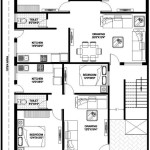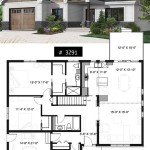Where to Get Free House Plans: A Comprehensive Guide
Obtaining suitable house plans is a crucial initial step in any construction project, large or small. While custom architectural blueprints provide the most individualized approach, the associated costs can be significant. For homeowners operating on a budget, or those seeking inspiration before committing to a paid design, free house plans offer a viable alternative. This article outlines various sources for acquiring free house plans, discussing the advantages, disadvantages, and critical considerations for each.
Understanding the Limitations of Free House Plans
It is essential to acknowledge the inherent limitations of free house plans before embarking on a search. These plans are typically generic, meaning they are not tailored to specific site conditions, local building codes, or individual homeowner preferences. Modifications will almost certainly be necessary to ensure compliance and functionality.
Furthermore, the level of detail provided in free plans often pales in comparison to professionally drafted blueprints. Information regarding structural engineering, plumbing, electrical systems, and HVAC may be limited or completely absent. This lack of detail can lead to unforeseen expenses and delays during the construction process.
Finally, the copyright status of free plans can sometimes be unclear. Using plans that are not explicitly licensed for free use could result in legal issues down the line. Exercising due diligence and verifying the terms of use is paramount.
Key Sources for Free House Plans
Despite the aforementioned limitations, several reputable resources offer access to free house plans. These sources vary in terms of the types of plans offered, their level of detail, and the terms of use associated with them.
Online Architectural Plan Repositories
Several websites function as repositories for architectural plans, including some offering free options. These websites often feature a curated collection of plans submitted by architects, designers, and builders. Users can typically search and filter plans based on various criteria, such as square footage, number of bedrooms, and architectural style.
Websites offering free house plans in this category often include:
- Open Source Architect: This platform provides plans under an open-source license, promoting collaborative design and adaptation.
- FreePlans.com: This website offers a collection of free plans for various building projects, including houses, garages, and sheds.
- Houseplans.pro: While primarily offering paid plans, this site often includes a selection of free plans as a promotional tool.
When using these resources, it is critical to carefully review the plan details and disclaimers. Verify that the plans meet your basic requirements and that the website grants permission for free use. Be prepared to engage a qualified professional to review and modify the plans before construction.
Government Agencies and Educational Institutions
Certain government agencies and educational institutions may offer free house plans as a public service or as part of academic research. These plans are often designed to promote sustainable building practices or affordable housing options.
For example, some local governments may provide free plans for accessory dwelling units (ADUs) or small houses to address housing shortages. Similarly, university architecture departments may offer free plans developed by students as part of their coursework.
These plans can be a valuable resource, particularly if they are tailored to local climate conditions and building codes. However, it is still essential to have them reviewed and adapted by a licensed professional.
Building Material Manufacturers and Suppliers
Building material manufacturers and suppliers sometimes offer free house plans as a marketing tool to promote their products. These plans typically incorporate the manufacturer's specific materials and products, which can incentivize the homeowner to purchase from them.
While these plans can be a useful starting point, it is important to consider whether the specified materials are truly the best choice for your project. Be wary of plans that overly emphasize a single manufacturer's products at the expense of overall quality or cost-effectiveness.
Furthermore, ensure that the plan specifications align with local building codes and regulations. It may be necessary to make modifications to accommodate alternative materials or construction methods.
Evaluating Free House Plans: Key Considerations
Once you have identified potential free house plans, it is crucial to evaluate them carefully to determine their suitability for your project. Several key factors should be considered during this evaluation process.
Compliance with Local Building Codes
Building codes vary significantly from one jurisdiction to another. A plan that is compliant in one location may not be compliant in another. It is imperative to verify that the plans you are considering meet the specific requirements of your local building code. This typically involves consulting with a building inspector or a qualified architect or engineer.
Pay particular attention to requirements regarding structural integrity, fire safety, energy efficiency, and accessibility. Failure to comply with building codes can result in costly delays, fines, or even the rejection of your project.
Site-Specific Considerations
Free house plans are rarely designed with specific site conditions in mind. Factors such as soil type, topography, climate, and orientation can significantly impact the suitability of a particular plan. A geotechnical engineer may be required to analyze the soil and provide recommendations for foundation design. Similarly, an architect or engineer can assess the site's orientation and climate to optimize the building's energy efficiency.
Consider the prevailing winds, sun exposure, and potential for flooding or erosion. Adapt the plans as necessary to address these site-specific challenges.
Structural Integrity and Engineering
The structural integrity of a building is paramount to its safety and longevity. Free house plans may lack detailed structural engineering information, which can pose a significant risk. It is essential to have a qualified structural engineer review the plans and ensure that they are adequate to withstand local wind and seismic loads.
The engineer can also assess the size and spacing of structural members, such as beams, columns, and footings. They can provide recommendations for reinforcement and connection details to ensure the building's stability.
Energy Efficiency and Sustainability
Modern building codes increasingly emphasize energy efficiency and sustainability. Free house plans may not incorporate the latest energy-saving technologies or design strategies. Consider incorporating features such as high-performance windows, insulation, and HVAC systems to reduce energy consumption and lower utility bills.
Orient the building to maximize passive solar heating and cooling. Use sustainable building materials and practices to minimize the environmental impact of the project.
Future Modifications and Adaptability
Think about your future needs and how the house might need to be modified to accommodate changing circumstances. Consider whether the plan allows for future additions, renovations, or alterations. A flexible design can save time and money in the long run.
Evaluate the potential for adding a second story, expanding the living space, or converting a garage into a dwelling unit. Ensure that the plans are adaptable to meet your evolving needs.
The Importance of Professional Consultation
Regardless of the source or quality of free house plans, it is crucial to consult with qualified professionals before commencing construction. An architect, engineer, or building contractor can provide valuable insights and guidance to ensure the project's success.
A licensed architect can review the plans, assess their suitability for your site, and make necessary modifications to meet your specific needs and preferences. They can also provide design expertise to enhance the building's aesthetics and functionality.
A structural engineer can verify the structural integrity of the plans and provide recommendations for reinforcement and connection details. They can also ensure that the plans comply with local building codes and regulations.
A building contractor can provide cost estimates, manage the construction process, and ensure that the project is completed on time and within budget. They can also help you navigate the complexities of the building permit process.
Engaging these professionals can seem like an added expense, but it is an investment that can save you time, money, and headaches in the long run. Their expertise can help you avoid costly mistakes and ensure the quality and safety of your home.

180 Best Free House Plans Ideas In 2024 Dream

Free Plan American Design Concepts Llc

Free Small House Plans For Old Remodels Bedroom Floor

3 Bedroom House Plans Home Designs Nethouseplansnethouseplans

Free House Plans 8x17 Meter 27x56 Feet 3 Beds Full Samhouseplans

Free Modern House Plans Designed By Truoba Architects

Free Home Plans House Floor

Free Residential Home Floor Plans Evstudio

Free House Plans Sample Houseplansdirect

Free Modern House Plans Designed By Truoba Architects








